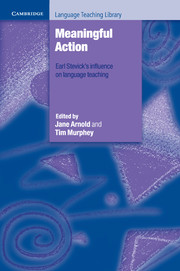Book contents
- Frontmatter
- Contents
- List of contributors
- Acknowledgements
- Preface
- Introduction
- Part A Meaning-making inside and between the people in the classroom
- Part B Meaningful classroom activity
- Part C Frameworks for meaningful language learning
- Epilogue: A way with words – perspectives on the contributions and influence of Earl W. Stevick
- Appendix: Words of tribute to Earl Stevick
- Index
9 - Winnowing the past: towards a principled eclecticism
Published online by Cambridge University Press: 15 November 2023
- Frontmatter
- Contents
- List of contributors
- Acknowledgements
- Preface
- Introduction
- Part A Meaning-making inside and between the people in the classroom
- Part B Meaningful classroom activity
- Part C Frameworks for meaningful language learning
- Epilogue: A way with words – perspectives on the contributions and influence of Earl W. Stevick
- Appendix: Words of tribute to Earl Stevick
- Index
Summary
Introduction
In this chapter I shall examine three periods in language learning history: (1) the distant past, with its traditional practices of translation, repetition, rote memorization, reading aloud, etc. – all widely condemned with little or no empirical justification, (2) the more recent past: The Silent Way, Community Language Learning, Suggestopedia, Total Physical Response and the Natural Approach, and (3) the present: Dogme, Task-Based Learning, Cooperative Learning, and Content and Language Integrated Learning.
For each of the approaches examined, I shall attempt to draw out key features and principles which, if combined appropriately in a local context, could form the basis for a principled eclecticism accessible to teachers at the chalk face. I conclude that it is how teaching is done, rather than what is done, which is central to successful learning.
Preliminaries
Stevick once offered a riddle which posed the conundrum of the best method.
In the field of language teaching, Method A is the logical contradiction of Method B: if the assumptions from which A claims to be derived are correct, then B cannot work, and vice versa. Yet one colleague is getting excellent results with A and another is getting comparable results with B. How is this possible?
(Stevick 1976: 104–5)The recent history of English Language Teaching has been characterized by a sometimes fevered search for the Holy Grail of the best or most effective method (Maley 2005, 2006). Latterly, this has been combined with a compulsion to collect, analyse and evaluate data through research. In fact, research has become a major enterprise in its own right, linked to, yet still separate from, the daily teaching enterprise. In Memory, Meaning and Method, Stevick sets out two opposing views on the value of research for language teaching. On the one hand, there is ‘a belief that past failures have been due to insufficient knowledge, and that therefore we need to know more’. On the other, there is ‘the assumption that past failures – and successes – have come from the degree of wisdom with which we have handled what we have known at the time’ (Stevick 1976: 105).
- Type
- Chapter
- Information
- Meaningful ActionEarl Stevick's Influence on Language Teaching, pp. 143 - 160Publisher: Cambridge University PressPrint publication year: 2013

